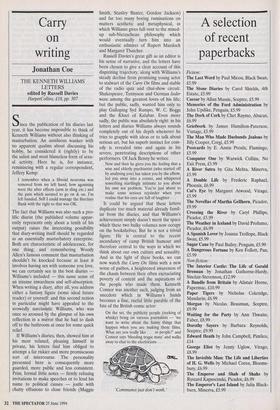Carry on writing
Jonathan Coe
THE KENNETH WILLIAMS LE I' LERS edited by Russell Davies HapperCollins, £18, pp. 307 Since the publication of his diaries last year, it has become impossible to think of Kenneth Williams without also thinking of masturbation. An assiduous wanker with no apparent qualms about discussing his hobby, he considered it (rightly) to be the safest and most blameless form of sexu- al activity. Here he is, for instance, reminiscing with a regular correspondent, Jeffery Kemp: I remember when a fibroid neuroma was removed from my left hand, how agonising were the after effects (arm in sling etc.) and the pain which seemed to go on & on. I'm left handed. Still I could manage the Barclays Bank with the right so that was OK.
The fact that Williams was also such a pro- lific diarist (the published volume appar- ently represents only about a tenth of his output) raises the interesting possibility that diary-writing itself should be regarded as an essentially masturbatory enterprise. Both are characteristic of adolescence, for one thing; and • remembering Woody Allen's famous comment that masturbation shouldn't be knocked because at least it involves having sex with someone you love, we can certainly see in the best diaries Williams's included — this same sense of an intense inwardness and self-absorption. When writing a diary, after all, you address either a fantasy figure (some ideal future reader) or yourself: and this second notion in particular might have appealed to the avowedly narcissistic Williams, who was once so aroused by the glimpse of his own reflection in a mirror that he had to dash off to the bathroom at once for some quick relief.
If Williams's diaries, then, showed him at his most relaxed, pleasing himself in private, his letters find him obliged to attempt a far riskier and more promiscuous sort of intercourse. The personality presented here is consequently more guarded, more public and less consistent. Prim, formal little notes — firmly refusing invitations to make speeches or to lend his name to political causes — jostle with chatty effusions to close friends (Maggie Smith, Stanley Baxter, Gordon Jackson) and far too many boring ruminations on matters aesthetic and metaphysical, in which Williams gives full vent to the mixed- up sub-Nietzschean philosophy which would eventually turn him into an enthusiastic admirer of Rupert Murdoch and Margaret Thatcher.
Russell Davies's great gift as an editor is his sense of narrative, and the letters have been chosen to give a clear account of this dispiriting trajectory, along with Williams's steady decline from promising young actor to stalwart of the Carty On films and stable of the radio quiz and chat-show circuit. Shakespeare, Tennyson and German lieder were among the greatest loves of his life; but the public, sadly, wanted him only to play Galloping Syd Rumpo, W. C. Boggs and the Khazi of Kalabar. Even more sadly, the public was absolutely right: in his letters and diaries Williams always sounds completely out of his depth whenever he tries to grapple with ideas or to talk about serious art, but his superb instinct for com- edy is revealed time and again in his severe, penetrating descriptions of other performers. Of Jack Benny he writes:
Now and then he gives you the feeling that a wise and elderly psychiatrist (who started off by analysing you) has taken you by the elbow, led you away into a corner, and whispered something startlingly intimate to you about his own sex problem. You're just about to make some serious rejoinder when you realise that his eyes are full of laughter . . .
It could be argued that these letters duplicate too much material already famil- iar from the diaries, and that Williams's achievement simply doesn't merit the space which these two bulky volumes now occupy on the bookshelves. But he is not a trivial figure. He is central to the recent ascendancy of camp British humour and therefore central to the ways in which we think about our own culture and sexuality. And in the light of these books, we can now watch the Carty On films with a new sense of pathos, a heightened awareness of the chasm between their often excruciating poverty of content and the aspirations of the people who made them. Kenneth Connor was another such, judging from an anecdote which in Williams's hands becomes a fine, rueful little parable of the fate of the British comic actor:
On the set, the publicity people (reeking of whisky) bring on various journalists — 'we want to write about the funny things that happen when you are making these films. What are you really like . . . as people?' and Connor says 'bleeding tragic mate' and walks away to chat to the electricians .. .
`Communes just don't work'
































































 Previous page
Previous page